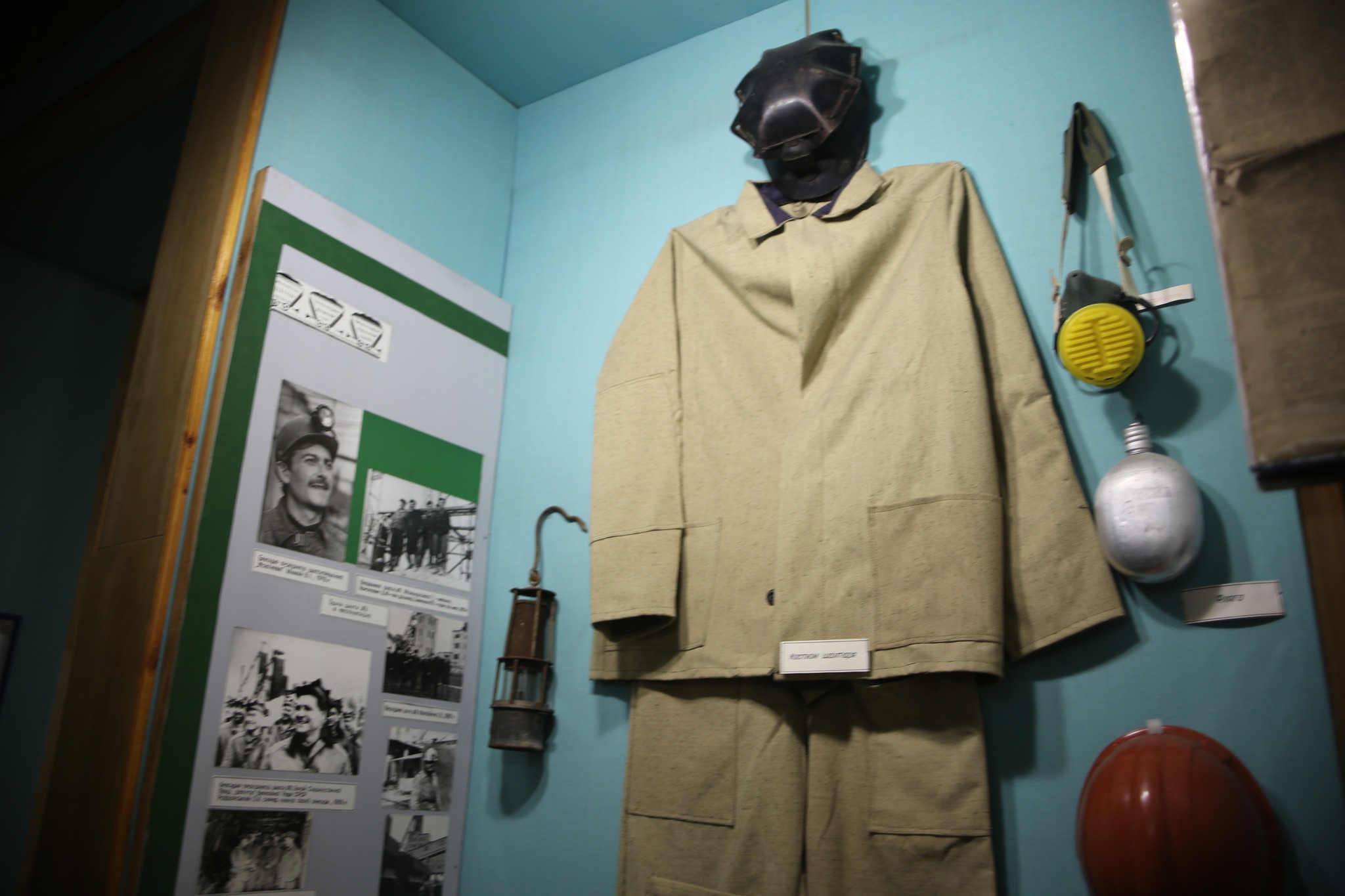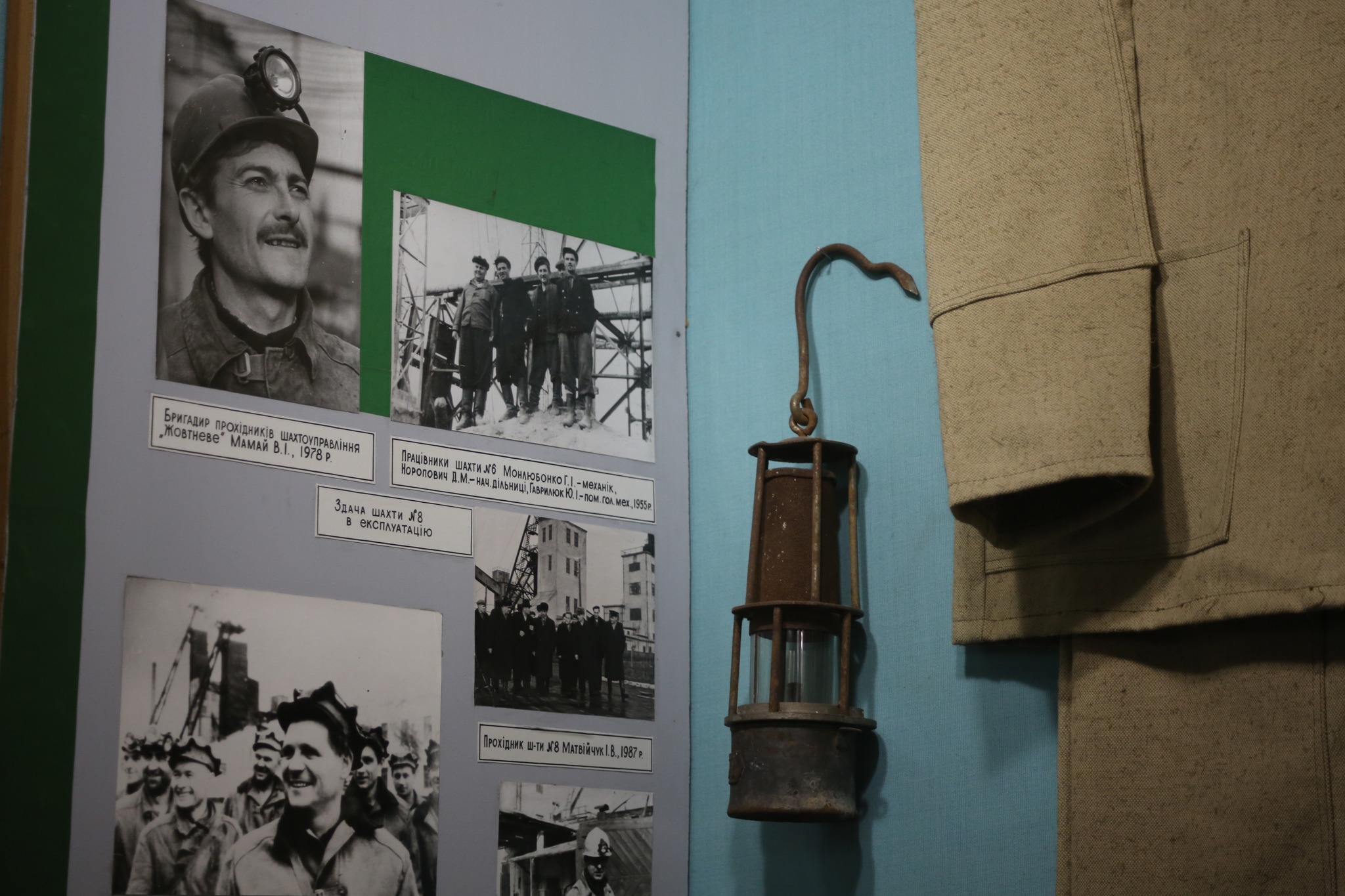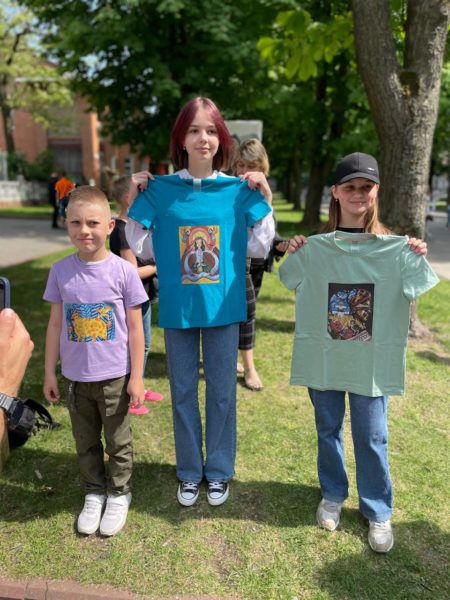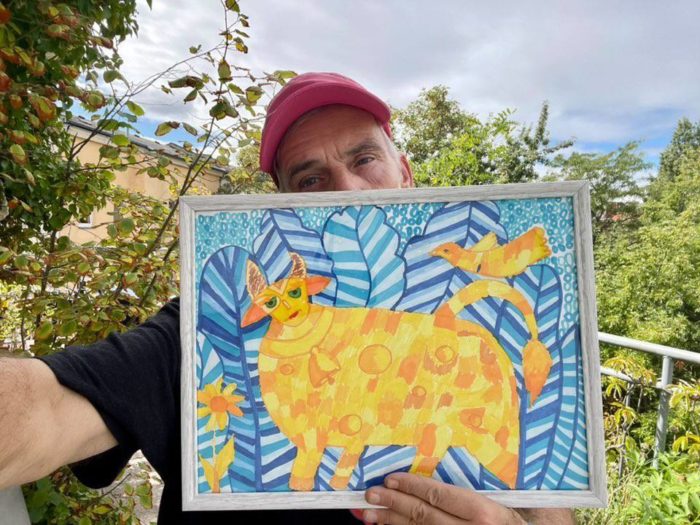- Part 1: The Novovolynsk miracle: how Russia’s invasion turned a Ukrainian mining town into an uber-volunteer hub
- Part 2: Businesses fleeing war to west Ukraine find a new life and help the army
- Part 3: Ambitious wartime story of Bodro clinic’s survival and growth (coming soon)
- Part 4: Developing culture amid war (coming soon)
- Video: Town that volunteers for Ukraine's victory
To underpin state efforts in providing humanitarian aid, military equipment, and shelter for refugees, grassroots volunteering spread rapidly across Ukraine from the beginning of the full-scale Russian invasion. The small town of Novovolynsk, located near the Polish border, has been especially productive. There, public and private entities have worked together alongside civilian society since the first days of the war.
An influx of refugees increased the town’s population from 50,000 to 60,000, and its residents volunteered tirelessly to provide necessary aid to civilians and the military. Self-organized groups based in Novovolynsk coordinated, sorted, and delivered over 200 international aid trucks arriving in Ukraine in only two months.
Founded in 1957 by newcomers from across Ukraine, this young and vibrant mining town has historically been open and full of initiative. This manifested fully in the 2022 home front volunteering movement.
“The city is full of energy, a lot of initiative groups are here, but in addition, good work management was present here from the very first days,” Serhiy, a city development consultant from Kyiv who has returned to his hometown of Novovolynsk, told us.
One striking example is that 400 locals enlisted in the territorial defense in the first days of the war, while in other comparably sized cities, the number was closer to 50. Most of those enlisted are now serving at the front. Consequently, the proportion of its residents killed at war is also higher than in other cities.
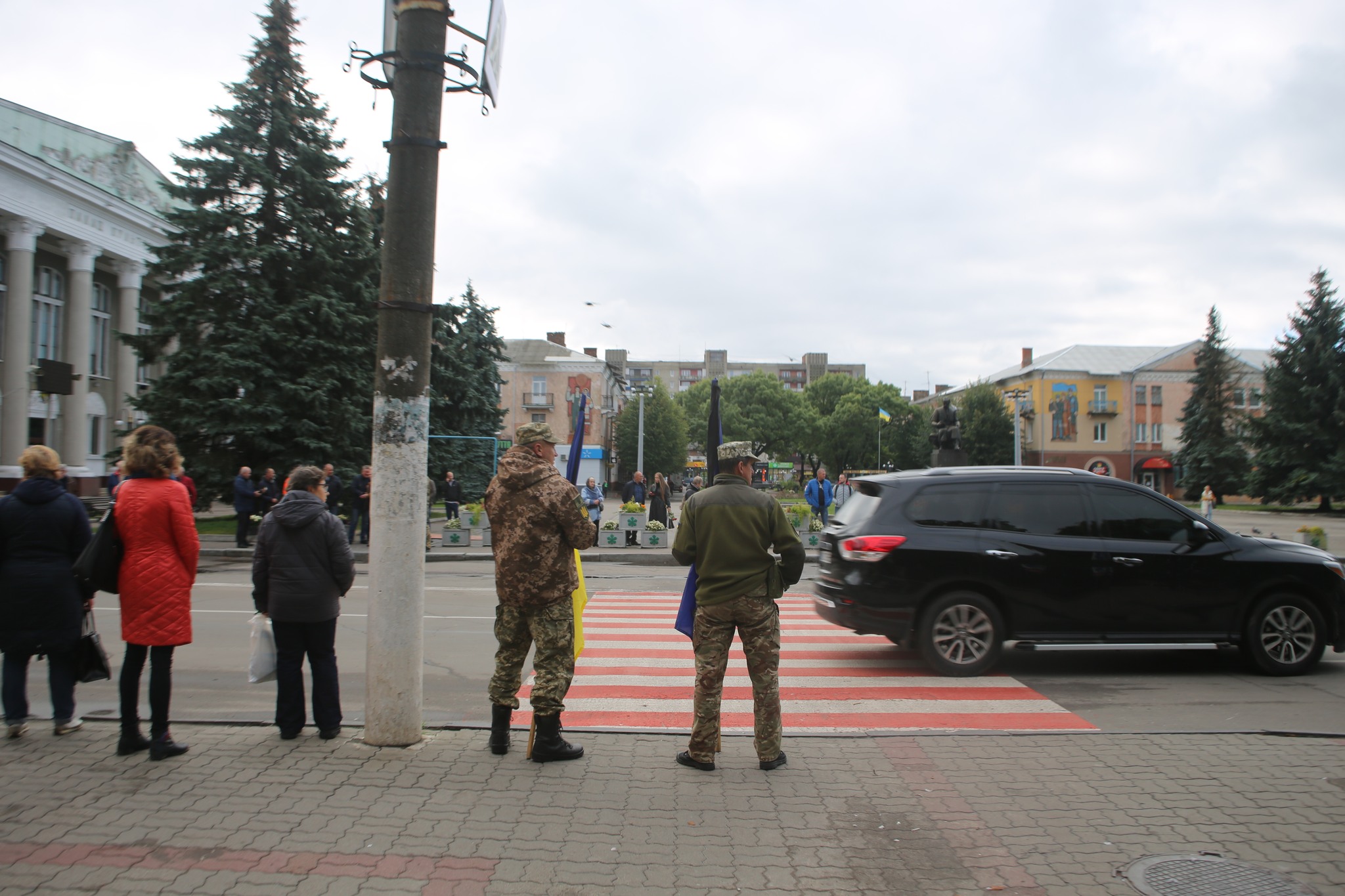
Displaced people are “not a burden, but our chance,” Novovolynsk mayor
“‘Contra sperm spero’ [against all odds, I hope] we believed that the invasion would not happen,” said city mayor Borys Carpus, referencing national poet Lesia Ukrayinka. “Yet many cities prepared somehow, and we did too. Though it wasn’t systemic, we had some military and medical training. What we managed thoroughly was bomb shelters. We went from basement to basement and checked them, although we did not understand exactly what their purpose should be,” he added.
The mayor stressed that when the full-scale invasion began, many tasks were outsourced to the large number of people who offered help. Humanitarian aid provision became fully independent of the council and was managed by volunteers. It grew into a massive volunteering hub from early into the war.
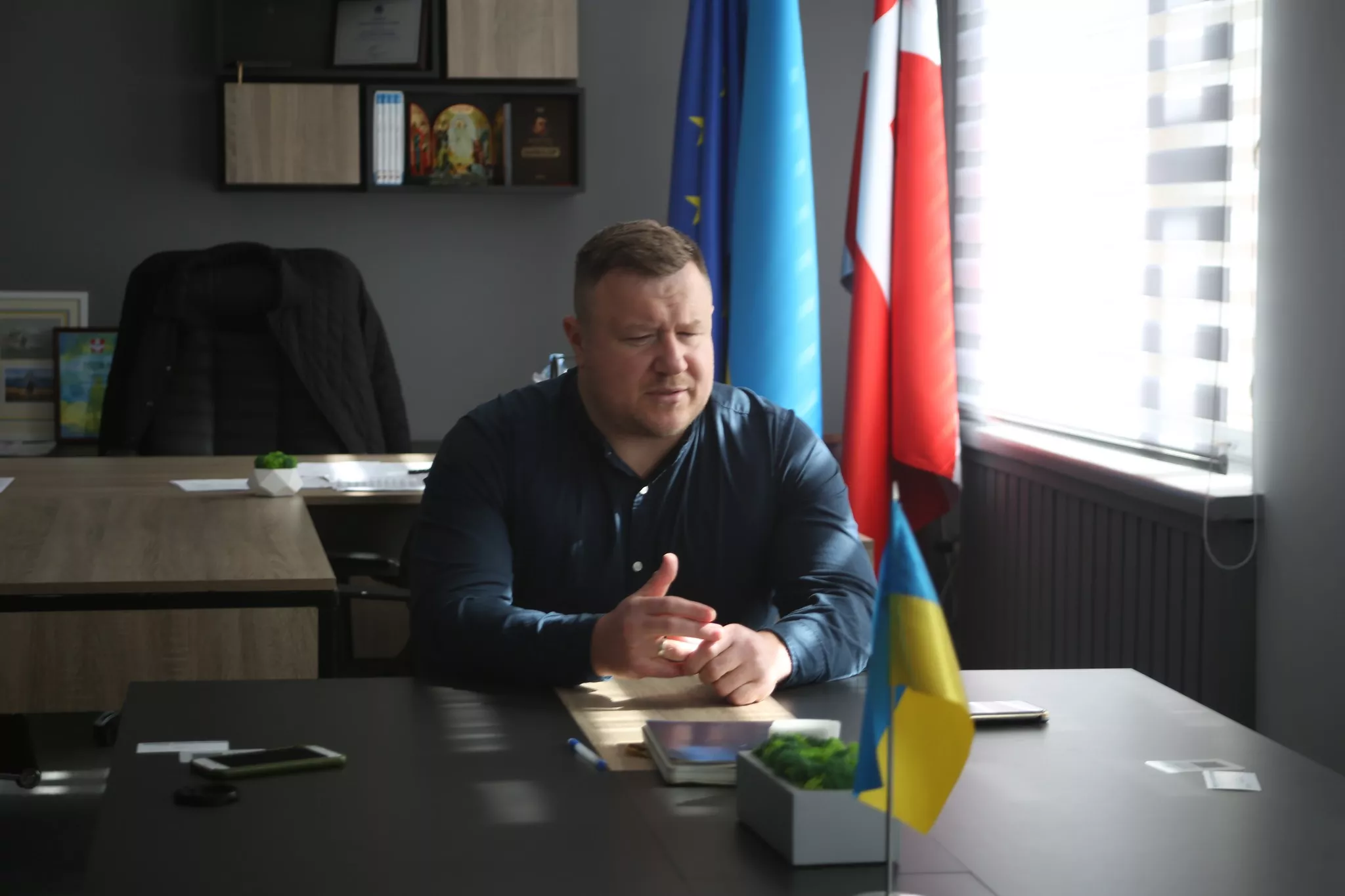
At that time, the border crossing was slow, with queues stretching out for seven days. The city council and volunteers had arranged to import humanitarian and military aid, but it needed to be transported into Ukraine. One volunteer proposed a solution: blinking lanterns and stickers that read “Humanitarian Aid” in English and Polish were affixed to cars transporting aid.
“Imagine, on the border our cars with beacons pass the queue, and everyone allows them and helps them pass,” deputy mayor Yuliya Lefter recalls.
In this manner, cars could leave and return with aid the same day.
The city council estimates that the town of initially 50,000 residents has grown by 10,000 IDPs, 6,200 officially registered in the city council. This is based on the information the city collected about the people who arrived – registration was completed by newcomers and locals, many of whom volunteered their apartments for this purpose.
The mayor emphasizes that the internally displaced people who arrived in the city are not a burden but an active part of the city.
“Before the war, we worked on a development strategy, and one of the points was demography. We all saw that it was negative, and a whole program was needed to increase the birth rate. And now, when these people have, unfortunately, arrived, it is actually a bonus for us, so to speak. Now we are working to ensure that the people who came here stay here. First, it is safe here, and secondly, we have enough kindergartens and schools,” the mayor explains.
People fleeing war-struck regions started volunteering in the west of Ukraine

Serhiy had been living in Kyiv while frequently traveling to various Ukrainian towns and cities to consult local governments on city development. He returned to his hometown of Novovolynsk in late February 2022 when Russia began its full-scale attack. While at the Novovolynsk city council to offer help, he encountered many like-minded people.
Deputy Mayor Lefter says that the first IDPs (internally displaced persons) who arrived in the city on 25 February were from Kyiv. Some had left long queues at the border and decided to stay in the town.
While some newcomers required help, others felt the urge to volunteer, supporting Ukraine’s rear. Lefter says that on the first day of war, many people came to their city council saying, “I am an IT specialist, I am an accountant, I have a car, I can do this or that, tell me how to help.”
Many groups have emerged, each assuming specific tasks. This gave the city council more time to deal with strategic tasks.
At the city entrance, the mayor welcomed refugees at the specially designed info post, inviting them to stay in Novovolynsk. People were provided with all the necessary information about staying in the town.
The first task was to respond to the high volume of phone calls coming to the city council in the first days of full-scale war. On 24 February, the mayor’s deputies sat in on calls to the city council to better understand the range of requests. Thanks to volunteers' support, they could delegate these tasks to those who offered help – including Serhiy.
The volunteer-run hotline worked 24/7 for two months. The city council provided space for volunteering initiatives – including rooms for volunteer initiatives on the first floor of the council; this “gave even more incentive to work and increased efficiency,” Serhiy says.
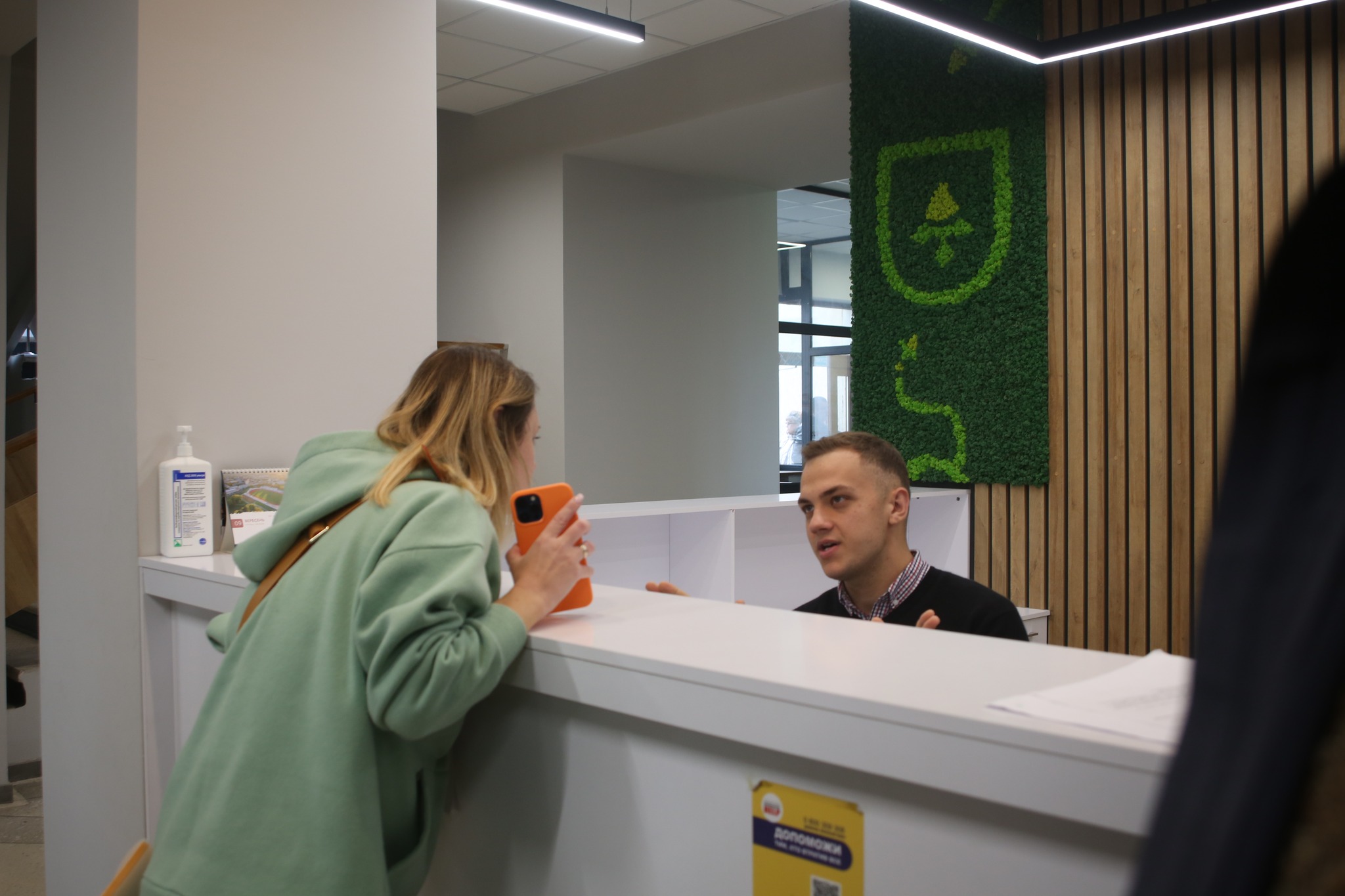
A city of volunteering and grassroots initiatives: a model for the future restoration of Donbas
Though its origins are improvised, the volunteer movement in Novovolynsk has developed into a complex and well-coordinated system to help the military and displaced persons. There were 23 locations in the town with various volunteering activities.
Serhiy consulted other cities and towns in Ukraine and said that, compared to their centralized volunteer initiatives, Novovolynsk's public and political activity levels are high enough to spawn dozens of different initiatives. However, he adds that volunteer activity “is consolidated when delivering help in the form of material assistance. That is, one driver goes to all the call centers, collects everything they offer, and then takes it away. And before that, the soldiers or communities near the frontline give us a list of what they need, and that’s how it goes.”
A group of highly-qualified managers, many of whom came to Novovolynsk from Kyiv in the early days of the war, ran this hotline, coordinating trucks arriving from abroad in four languages. In the first two months alone, they organized 200 trucks from various countries arriving with aid for Ukrainian civilians and the military. About 100 drivers helped them complete delivery from the border, where the supplies were often left, to Novovolynsk and throughout Ukraine.
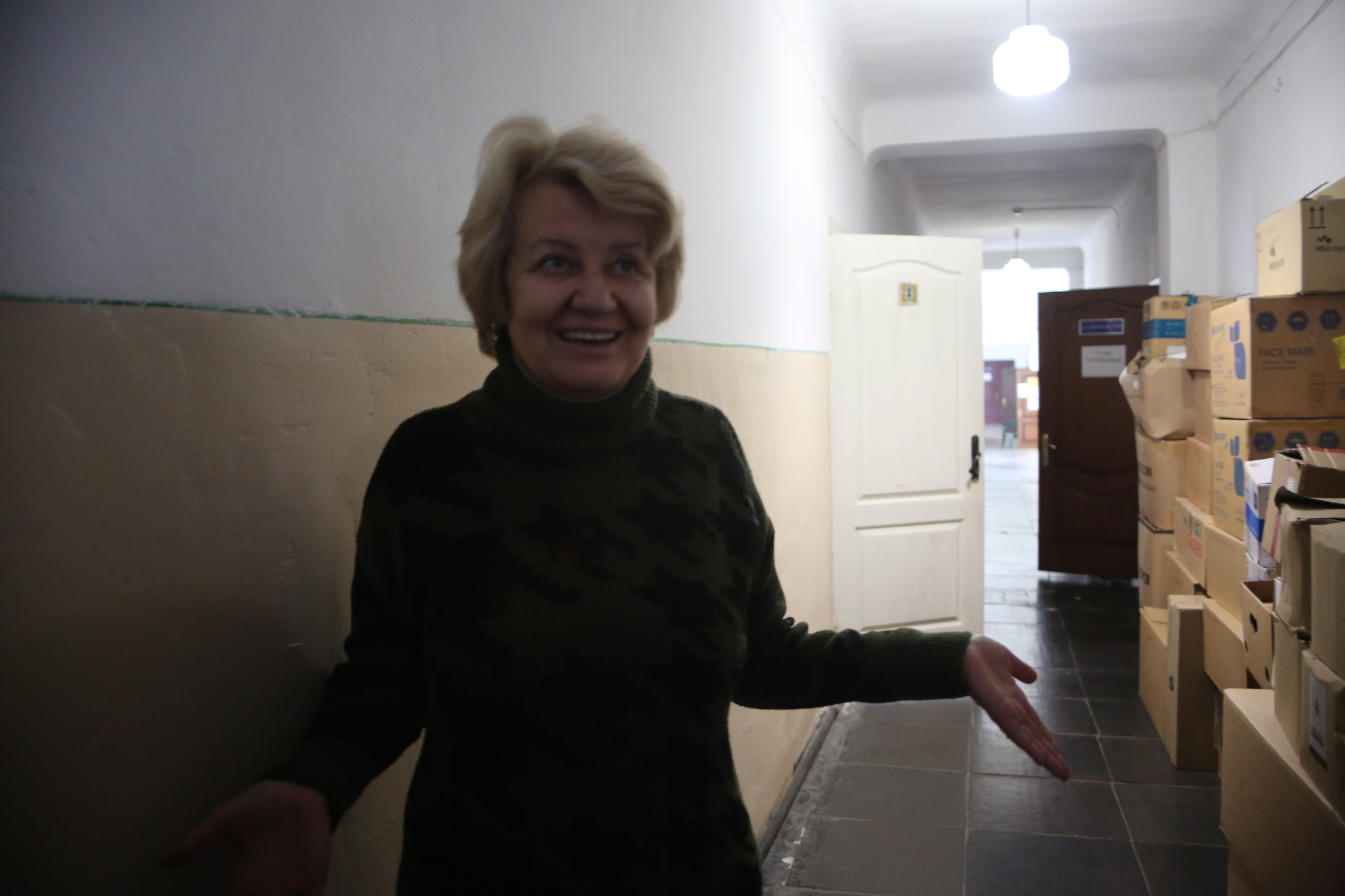
Kateryna, 63, who returned to her hometown of Novovolynsk from the Kyiv suburb Hostomel, coordinated a system of 14 warehouses where all incoming aid was sorted according to function and loaded onto Ukrainian trucks to be delivered to the regions of Ukraine that requested it.
“This is still an imperfect model, but I believe that [it] can work even in peacetime after the war. Dozens of grassroots initiatives and an adequate mayor [to ensure coordination]: it is a model of the future, and for the future reconstruction of Donbas."
Also, a new grassroots class of mayors and politicians from local self-government and condominium communities begins to appear.
"First, you are the chairman of the condominium management, then the local representative in the city council, then the mayor, then the national MP,” Serhiy said.
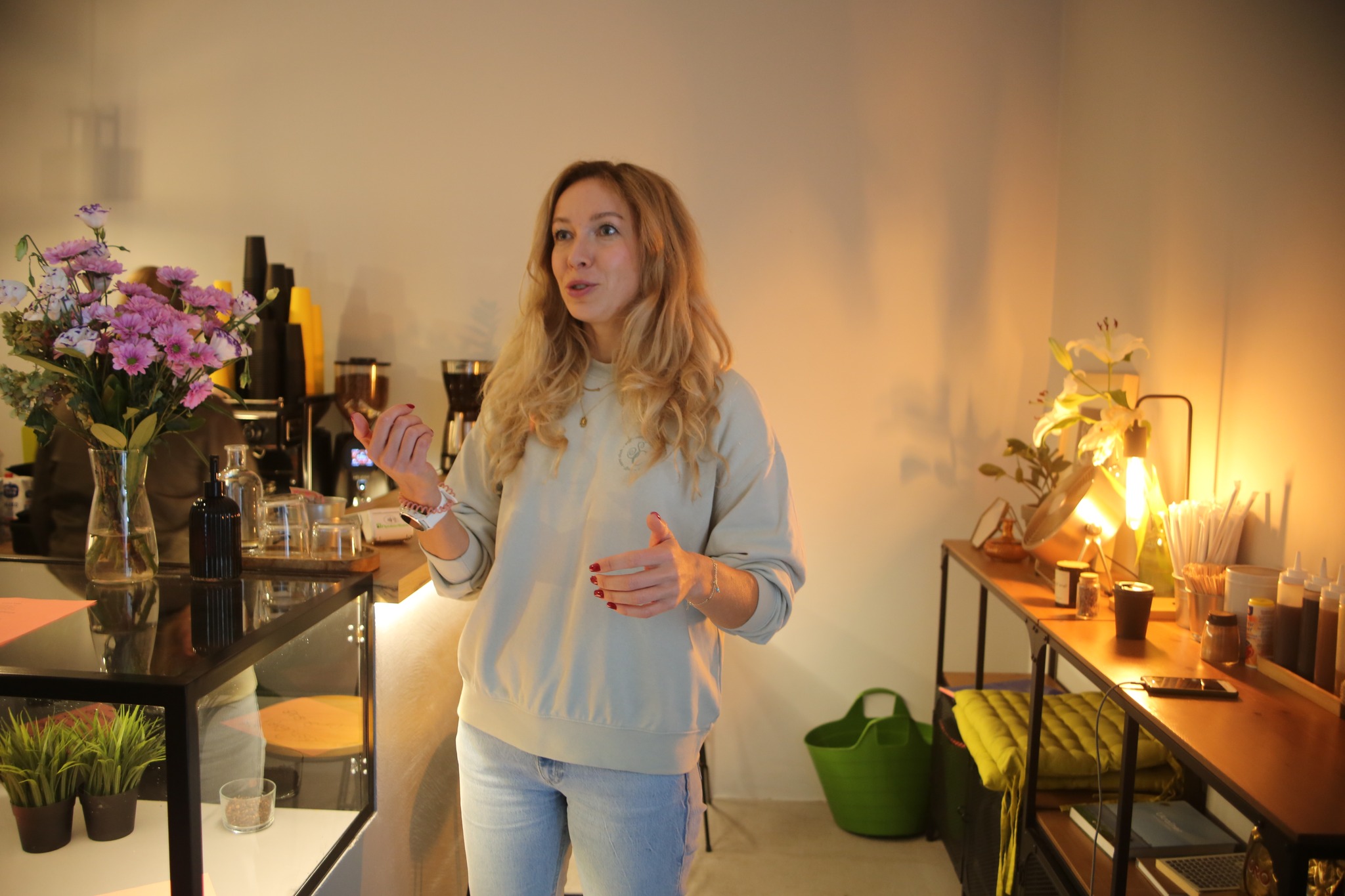
Katia Nakonechna, 32, was born in Novovolynsk and studied in Kyiv, where she remained a senior telecommunications director for Europe and Israel. Though travel is an essential component of her work – when we spoke, she was preparing for a short business trip to South Africa – she and her husband “knew for sure that we should not go abroad if something happened, but we decided that we would go here [to Novovolynsk].”
Just three days before the full-scale war, she planned to move to a new Kyiv flat; instead, she took her “emergency suitcase” and came to her home from Kyiv.
“My aunt works here at school, and we asked how to help and she immediately sent us to the council, to the mayor. And the city mayor says that humanitarian help will soon be coming [from abroad, and we [the city] will be 10 kilometers from the border, we will be a transit hub, so we need to organize logistics. Try to adjust the process, he told me,” Katia recalls.
Katia had experience in logistics before the war as the head of a logistics department. On February 25, she joined ten other highly qualified people who volunteered to help organize logistics. Other volunteers included marketing and IT directors, senior managers, businessmen, and lawyers.

The mayor gave them an office in the city council.
“10 people who have never seen each other needed to settle some new process from scratch. For the first two weeks, it was incredible chaos. It felt like being an American marine thrown into the water with tied hands,” Katia says.
During the first days, IT specialists purchased extenders and routers, and within a day, everyone was working with Wi-Fi, phones, and computers connected.
The volunteers worked independently from the city council, but Katia says they appreciated it when the mayor visited them to discuss problems. With a massive volume of calls on their hotline, the logistical center, named UHelp, was tasked with organizing a transparent process from the senders to the recipients on the front.
“It's not just something abstract. It's a truck with specific things. And you should not allow it to be lost. And there are a million options where it gets lost. There have been cases, not with us, but in general, those whole trucks were lost. And we organized work so that each truck was attached to a specific manager,” Katia says.
The team had a spreadsheet with all the information about the truck and its manager. “It was a supertask to develop such a system from nothing,” Kaia said. Volunteers often left their jobs to work for free. There was no boss, and no one gave orders. “Everyone understood that if there was a task, I could take it and solve it. For the first two months, we worked with only small breaks for sleep and without days off. There were cases when drivers took vacations from their regular jobs to volunteer with us,” Katia said.
his perspective, “ownership” is to assign someone responsibility for a task. “Help” is to assist in some one-time event, attempting to help without promising responsibility.
Serhiy once promised a friend that he would buy some medication. “I said, ‘I’ll do it,’ instead of ‘I’ll try to do it,’ and there’s a huge difference between the two. I took ownership, but there were no such medications anymore in March,” he remembers, adding that it took him several days to find such medication.
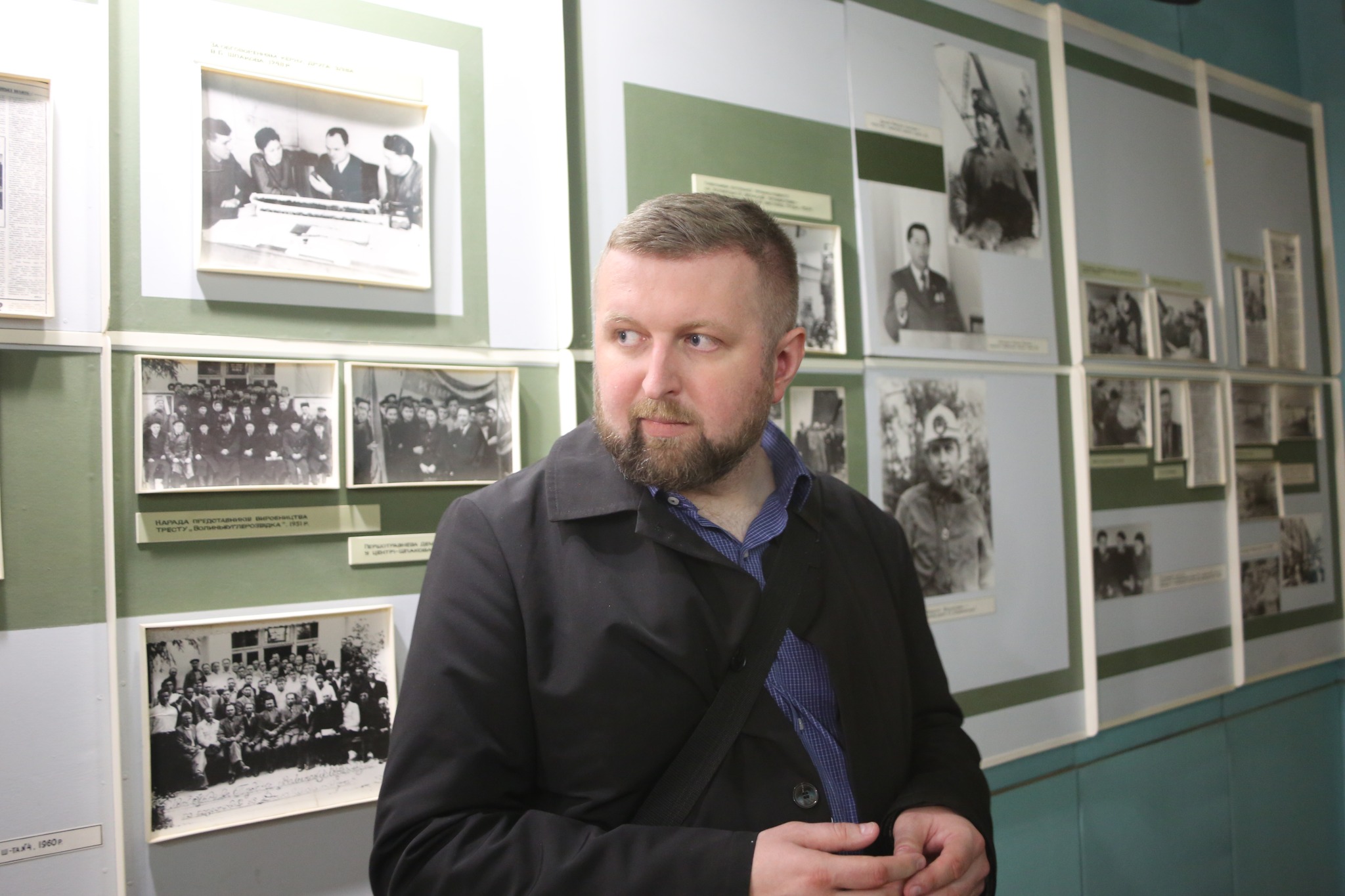
Drivers from abroad often refused to bring aid materials into Ukrainian territory and instead left it at the border. The team was tasked with finding people in Poland who could help. They found a Polish volunteer who had a warehouse and offered it for free.
“Everything was based on trust,” Katia said. “We tried to control everything, but we did not have cameras everywhere. In the rare instances when a driver would not bring the complete cargo two times, we would not assign them any tasks anymore.”
In total, there were about 600 drivers who worked as volunteers, delivering aid from the Ukrainian border to the Novovolynsk hub and then onward to frontline areas.
“In big cities, everyone wants to create institutions, and that’s good. But it doesn’t work here in small cities. Here one person is often an institution. Or simply a good organization of work, where a person is engaged in a certain task part of the time and is well-integrated into the city-wide system,” Serhiy, who worked together with Katia, said.
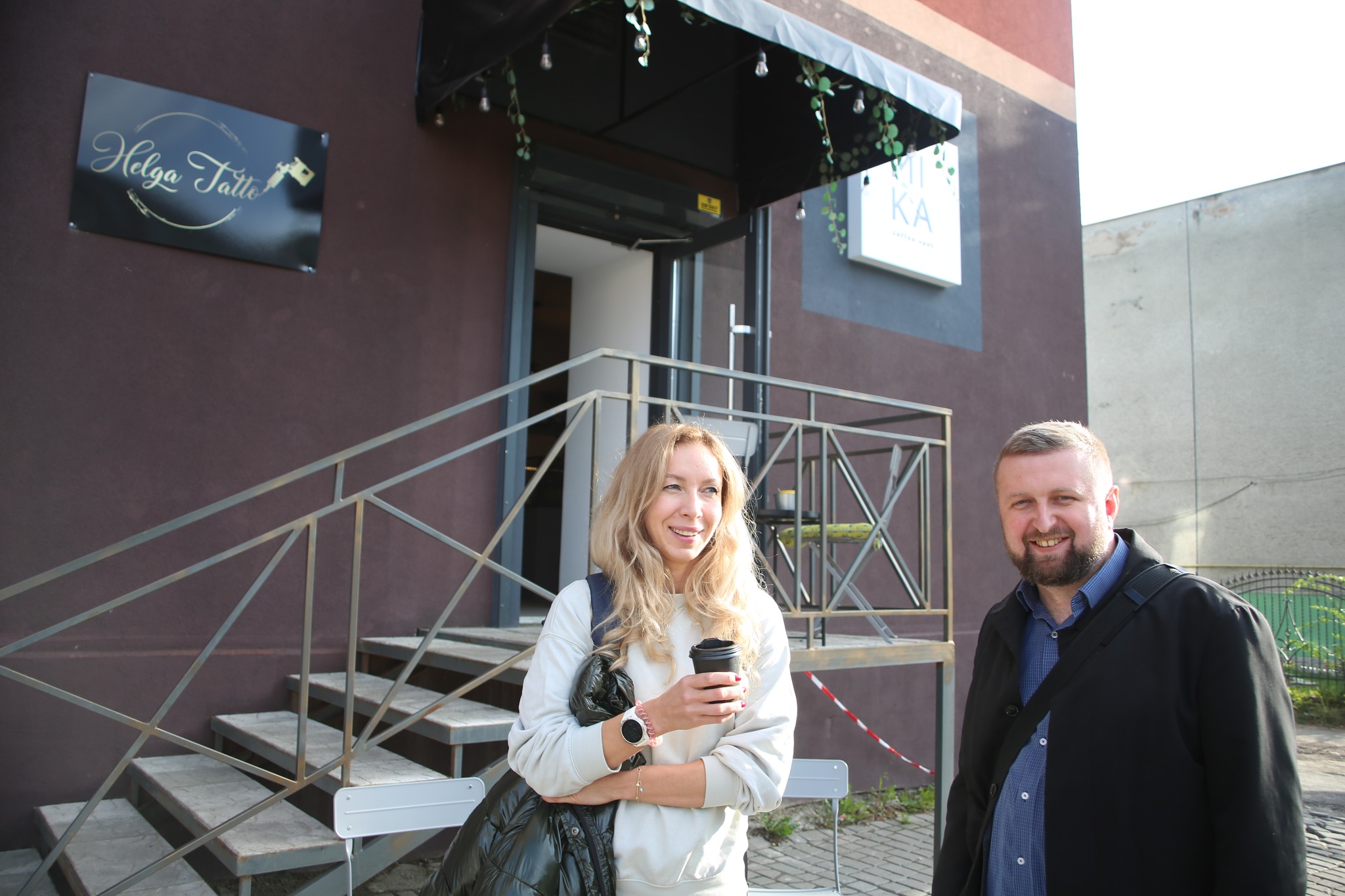
“There was a moment when there were too many jobs to be done and everyone started to grab everything,” Katia shared. “It was the worst because if you take 20 tasks, you won’t finish one. I then said that if you each take one task and complete it today, it’s much better than if you take ten and don’t finish a single one. There are 45 million of us [Ukrainians]; that is, if everyone takes one task a day, there will be 45 million completed tasks. It’s effective,” Katia says.
Another challenge was when the drivers ran out of fuel. By chance, Katia’s acquaintance, who volunteered in logistics in different cities, advised the Foundation, which later donated 500,000 UAH ($13,500) worth of fuel to Novovolynsk volunteers.
After two months of full-time volunteering, Katia returned to work part-time. She worked in the morning “because as soon as you come to the volunteering center, it is such a stream [of work] that you cannot leave until the evening.”
Katia also noticed that “there was not enough cool Ukrainian merch. And I love quality things. So we made sweatshirts and t-shirts with the design ‘Bombing for peace is like fucking for virginity.’ We also held drawing contests among children, and three drawings were later printed on t-shirts.”
As time passed, the volunteers arranged targeted purchases of thermal imagers, drones, and helmets for the military. “Now we have switched to Starlinks,” Katia tells us in September. “This is also fully reported so that donors can be sure they have reached specific destinations.”
“In the first days of war, you felt as if you were on some drugs, you just worked. And I sincerely believed that this Novovolynsk drive could turn into a national level of warehouses. [...] And then, when the Russians were driven from Kyiv and the Kyivnas returned back to the capital, the gigantism decreased, but the initiative remained,” Serhiy said.
At the start of the war, many quit their jobs and rushed to volunteer, opening 14 aid warehouses in Novovolynsk alone
While the “hipster” team from Kyiv worked in the logistical center they created, another team of volunteers worked in the 14 warehouses where this aid was arriving and further distributed.
Kateryna, 63, moved to Hostomel in Kyiv Oblast, where the war caught her. She survived the first days of the war there, living under shelling with her daughter, son-in-law, and grandchildren.
“This period of being in the basement, when the Hostomel airfield was bombed and I saw my children and grandchildren with frightened eyes, helpless. We then ran from the city, and just fifteen minutes later the Russians were at our house. The bridge to Kyiv was already broken,” Kateryna remembers.
Kateryna could have gone to the US with her daughter, but she decided to stay in Ukraine. “I have a very strong desire to wait for victory here so that my children can return here,” she explained.
When Kateryna brought her granddaughter to the border for her departure to the US, the 7-year-old asked, “Grandma, will the Russians come to America?” The little girl forgot her phone at home in Hostomel and later sent a message to it: ‘Russians, you are the worst people on Earth. You will listen to my message, but know that you will die a second after you listen to it.’ Kateryna commented, “She wrote a lot of different things there, even though she is only 7 years old.”
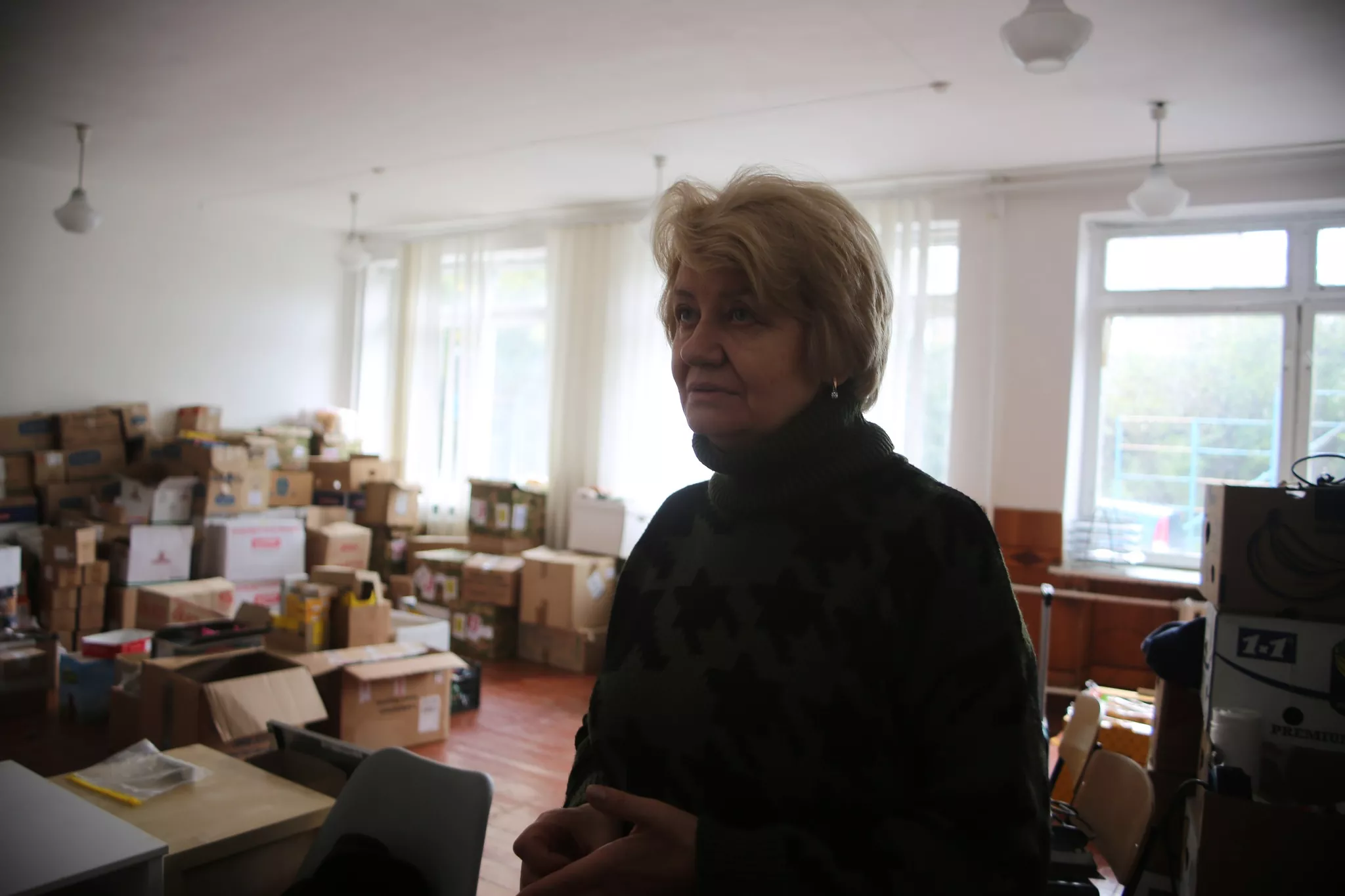
On 26 March, Kateryna came to Novovolynsk and immediately contacted the mayor to help.
“Then, on the 26th, everything in Novovolynsk worked like a Swiss watch. The topic of displaced persons was already organized, and the topic of humanitarian aid was being developed. It was necessary to account for all the humanitarian aid and to organize warehouses somewhere in order to sort it and send it on. Our task was to organize everything quickly,” Kateryna said.
At its peak, there were 100 cars collecting aid and 650 drivers helping the volunteer staff, Kateryna said, adding that humanitarian aid mostly comes from Germany, Poland, the Netherlands, Italy, and the Baltic countries.
People from across Ukraine volunteered in Novovolynsk to redistribute humanitarian aid to the places most needed.
“There are no cities [in Ukraine] from which volunteers did not come to Novovolynsk. Bucha, Hostomel, Irpin, Borodianka, Kherson, Mykolaiv, Kharkiv,” Kateryna said.
Since the volunteers maintained connections in their hometowns, the hub was able to organize local deliveries directly to the points where help was really needed.
For example, they delivered aid to many local hospitals.
“Once volunteers came and said they opened a hospital relocated from Iprin in Lutsk, but there is a problem because the guys [the soldiers] just sleep on the ground. And just then functional beds came to us from the Netherlands. We packed them, contacted drivers who transited through Lutsk, and delivered then,” Kateryna said.
Now about 50% of locals and displaced people are helping, Kateryna says. One of them is Danylo, a 20-year-old volunteer from Bakhmut in Ukraine's east. He came to Novovolynsk in August after receiving a shrapnel wound in his leg from Russian shelling when a mine fell about 80 meters from him.
At the beginning of the war, few people continued to work in their ordinary jobs, and everyone rushed to volunteer, Kateryna said. She added that now people often work and volunteer part-time “because it is impossible to leave this.”
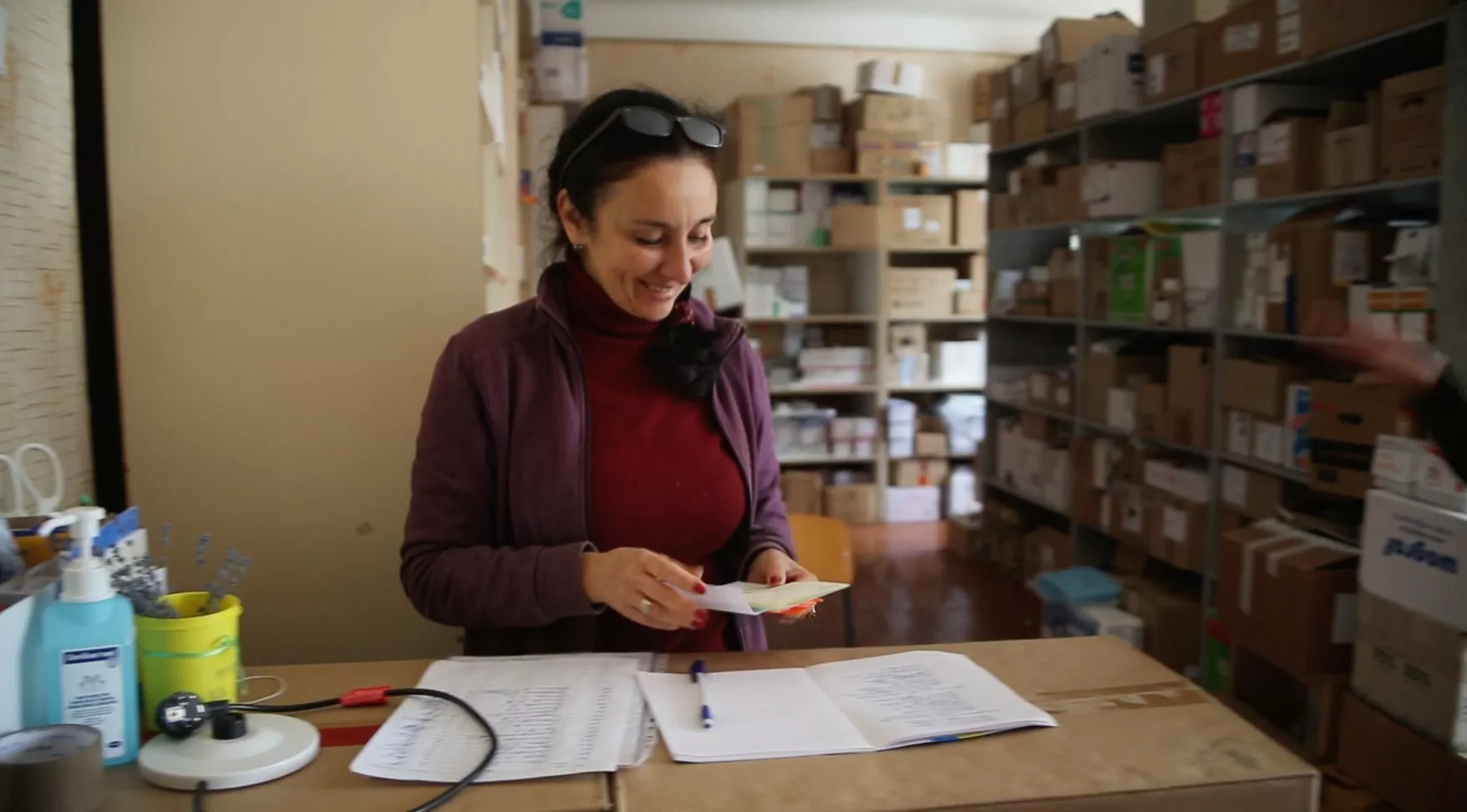
Like Kateryna, Svitlana has been volunteering in Novovolynsk since the first days of the war. She previously owned her own pharmacy but sold it before the war. Now she and her husband help the medical department acquire medications. They often travel to Poland, where they purchase drugs 20-30% cheaper than in Ukraine.
To stretch their resources, volunteers also sew and pack military first-aid kits themselves.
“One first-aid kit costs upwards of 200 dollars if you buy it. And we sew and assemble kits ourselves from medicines that are brought here as charitable aid. This first-aid kit includes everything provided in the standard one, but costs about 20% less,” Kateryna explains.
In addition to supplying the military with aid, the warehouse provides medicine to many displaced people.
Aliona, 24, moved to Novovolynsk from Shchastia in Luhansk Oblast in April. She came to the warehouse with her friend to take hygiene products for their babies.
“First, my friend and I went to Lozova in Kharkiv Oblast because her parents live there. But it also became dangerous there, so we came here to Novovolynsk. Novovolynsk is great, kind people, good infrastructure, and many cafes and playgrounds. I was in Lutsk [the regional capital], but housing there is expensive, so we moved to Novovolynsk again. I can’t say yet whether we will stay here. I want to go home, but no one knows what will happen next. However, with the latest counteroffensive, the news is good now,” Aliona said.
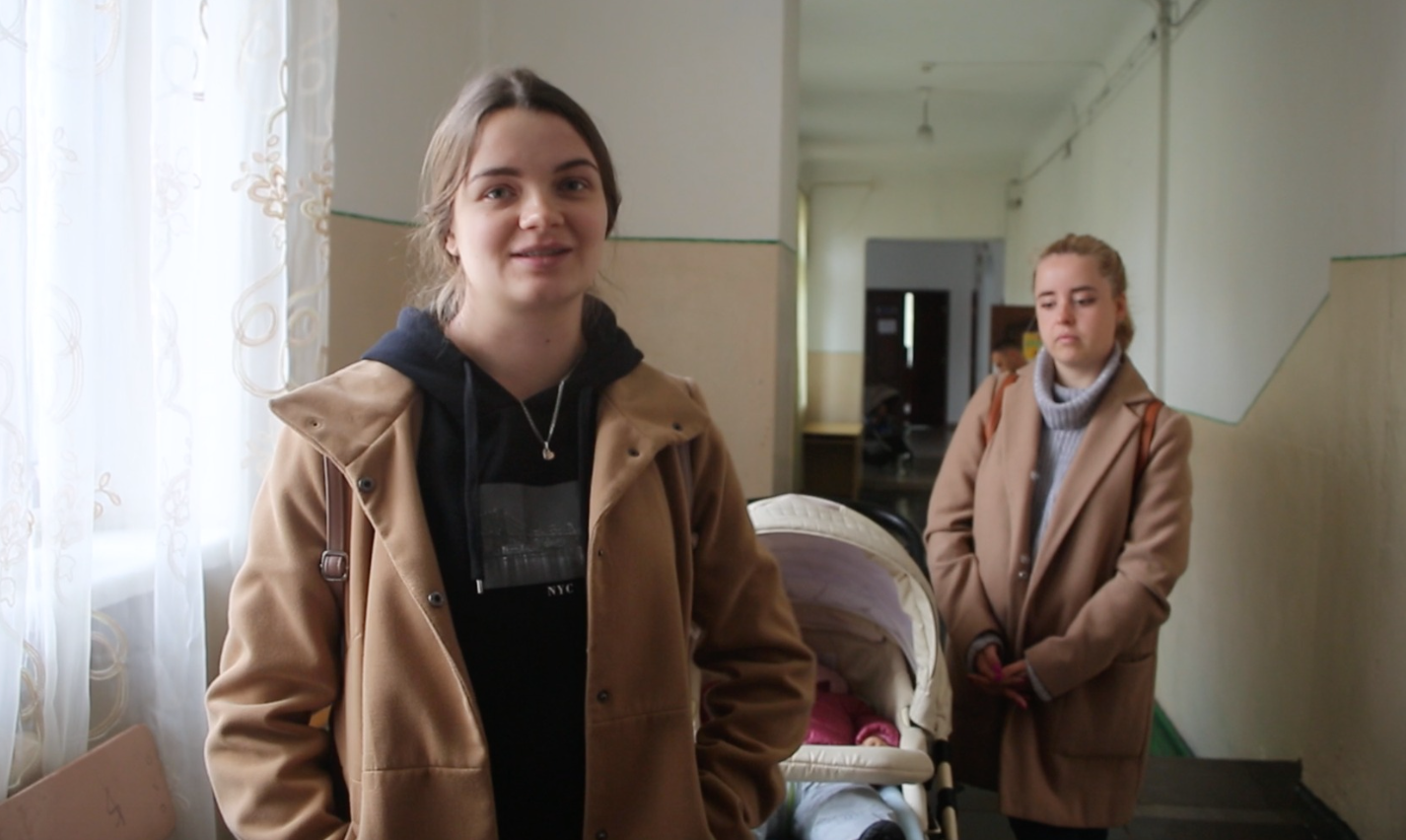
All who receive aid are also registered in the database so that the aid is distributed wisely, Kateryna explained.
“We have a common database, and when someone takes something we register it. The database is common for humanitarian aid, for Caritas, the local Red Cross. When we open this database, we see what kind of help a person received during the period he or she was here. Now, for example, we distribute second-hand furniture and immediately enter everything in the database to avoid waste or someone later reselling the humanitarian aid,” Kateryna said.
Dozens of Novovolynsk volunteering units produce, deliver, and distribute food, clothes, drones, and military first-aid kits in Ukraine
Dozens of volunteer units in Novovolynsk help with food, clothes, drones, and military first-aid kits. Clothing bank volunteers sorted 20 tons of donated clothes, including children’s summer and winter clothes plus men’s and women’s shirts, pants, and sweaters. Everything then had to be distributed.
On the premises of the Interschool Resource Center, 1,500 people received training in first aid and tactical fundamentals, including the assembly and disassembly of an AK rifle and shooting. Ivan Huntsman reported that 40% of the participants were women.
The Novovolynsk public canteen also donated its services and now feeds 500 people a day, most of whom are internally displaced.
Before the war, the canteen provided food for about 70 people with disabilities and elderly people, according to Nataliya Polishchuk, the canteen manager. At the start of the full-scale war, they began to feed displaced individuals. The canteen is supported by city authorities, entrepreneurs, and caring residents. It also cooperates with Caritas.
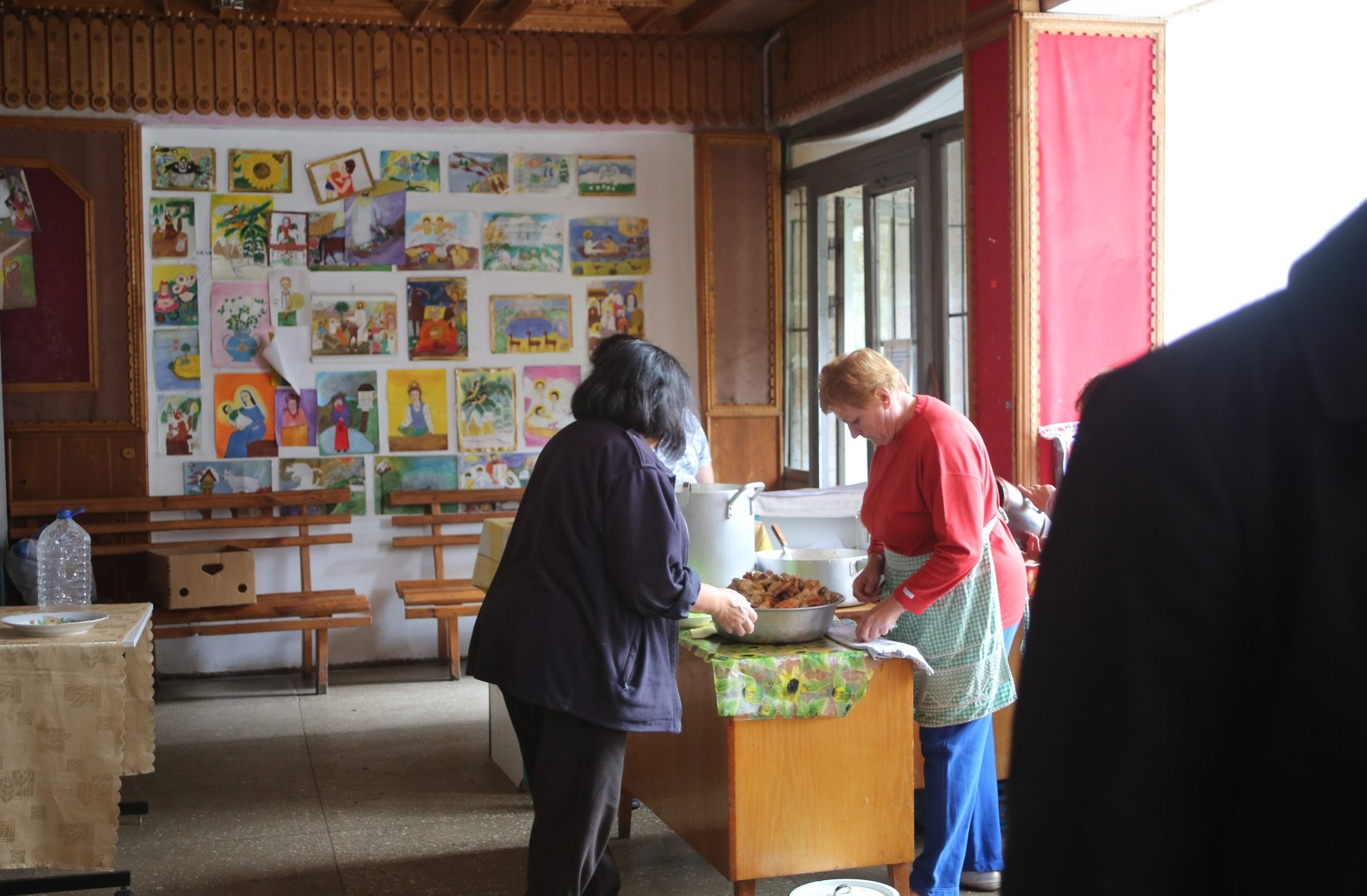
“Lunch includes the first course, second course, salad, and a drink. The menu is varied, we try to rarely repeat it and give out water. We also help with clothes and bedding,” Nataliya said.
The canteen helps both civilians and the Armed Forces. Each Wednesday since mid-July, they have baked pastries, sold pies, and raised money for a car. Nataliya says they have nearly reached their financial goal in only three months. They also bake food for volunteers who deliver humanitarian aid and are on the road.
The canteen worked for three months without any days off when the war began. Only after did they begin to take Saturdays and Sundays off. “But sometimes, when there is the need, we go to work on the weekend.” A total of 18 people work and volunteer here. Most of them are locals, but there are also displaced persons volunteering here, Nataliya said. There is another canteen in the nearby village of Blahodatne, where 4,000 live, including 700 displaced persons.
During our conversation, nearby church bells rang in the background, indicating the funeral of the three soldiers who were brought to Novovolynsk that morning as we arrived.
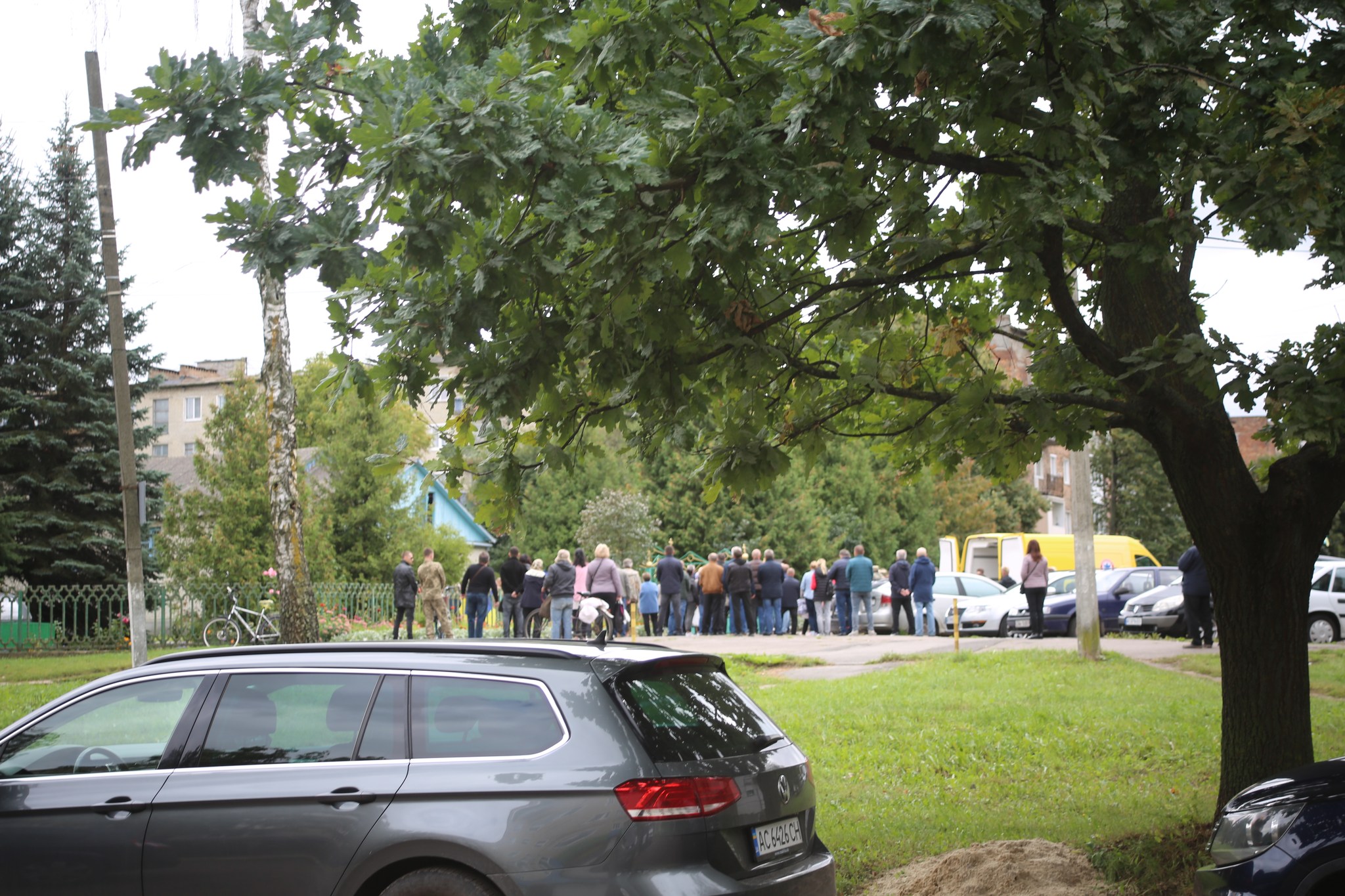
Preventing the modular towns "failure story"
More than six months into the full-scale war, the city council called all registered people to ask how many planned to stay in Novovolynsk. 64% said they plan to remain until the war's end, and 8% have already decided to live here permanently, the mayor reported. There has been no Russian shelling in Novovolynsk, so nearly all of the locals who went abroad at the beginning of the war have since returned.
The mayor also says that the city tried hard to attract international organizations helping refugees to work in Novovolynsk as these organizations usually do not have specific lists of places to help. In total, 13 organizations helped people who fled the war to Novovolynsk, including UN Acted, Triangle, and UNICEF.
Some people received one-time help of up to $550, and others had an additional $55 monthly. Besides, the town council tries to attract partner towns from Poland, Germany, Lithuania, and Chezhia, which had already provided some help treating children and humanitarian volunteer aid.
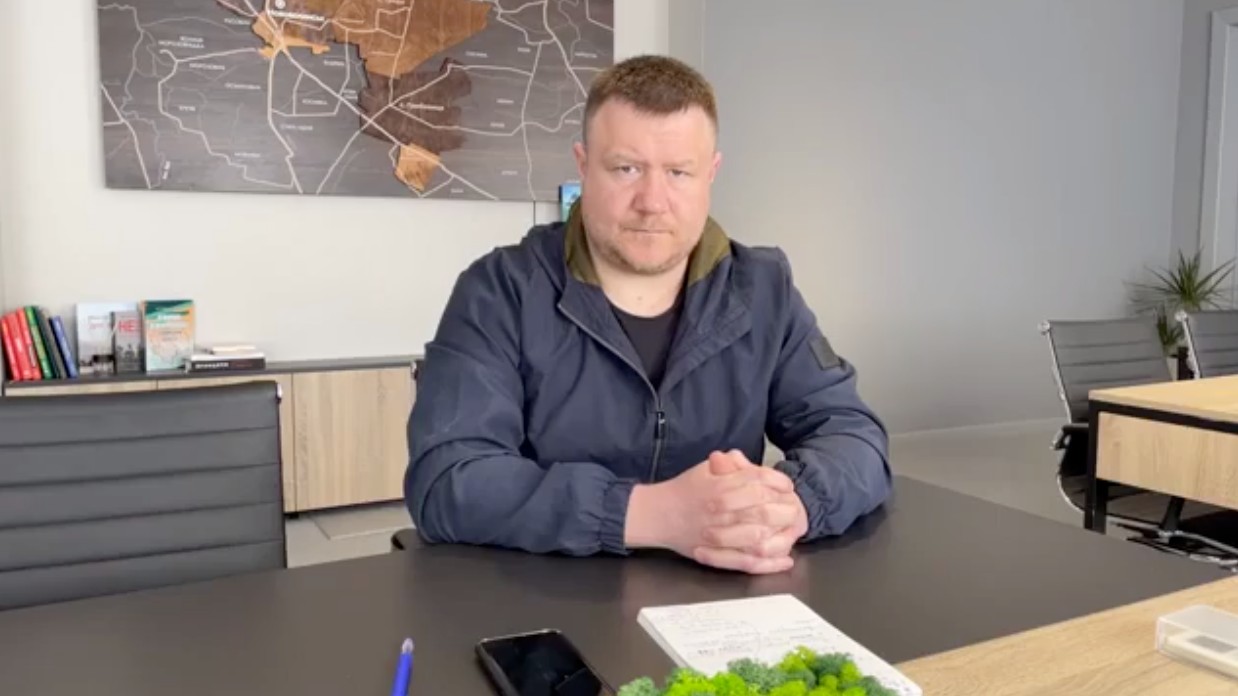
The city mayor explained that international aid organizations usually do not have lists of specific places to deliver aid so the city worked to attract them to deliver aid in Novovolynsk. In total 13 organizations have helped people who fled to Novovlynsk, including UN Acted, Triangle, and UNICEF. Some people received a one-time stipend of 550 US dollars, and others received an additional 55 US dollars each month. The town council also collaborates with its partner towns in Poland, Germany, Lithuania, and Czechia, which have already provided medical treatment for children and humanitarian volunteer aid.
Novovolynsk vastly uses contacts they had before the war. In particular, the town had a pre-war project with the German humanitarian organization GIZ. After the war, they changed it to purchase solid fuel boilers to diversify raw materials and depend less on gas. The city council also receives aid via collaboration with partner towns in Poland, Germany, Lithuania, and Czechia.
International organizations regularly come to Novovolynsk to distribute their aid. Partly this is due to the city council’s efforts to attract them, and partly due to its location near the Polish border. The day we arrived in Novovolynsk, people gathered in the city council hall to receive aid from International Charitable Foundation, founded by Ukrainian Americans, which now raises money to help displaced persons.
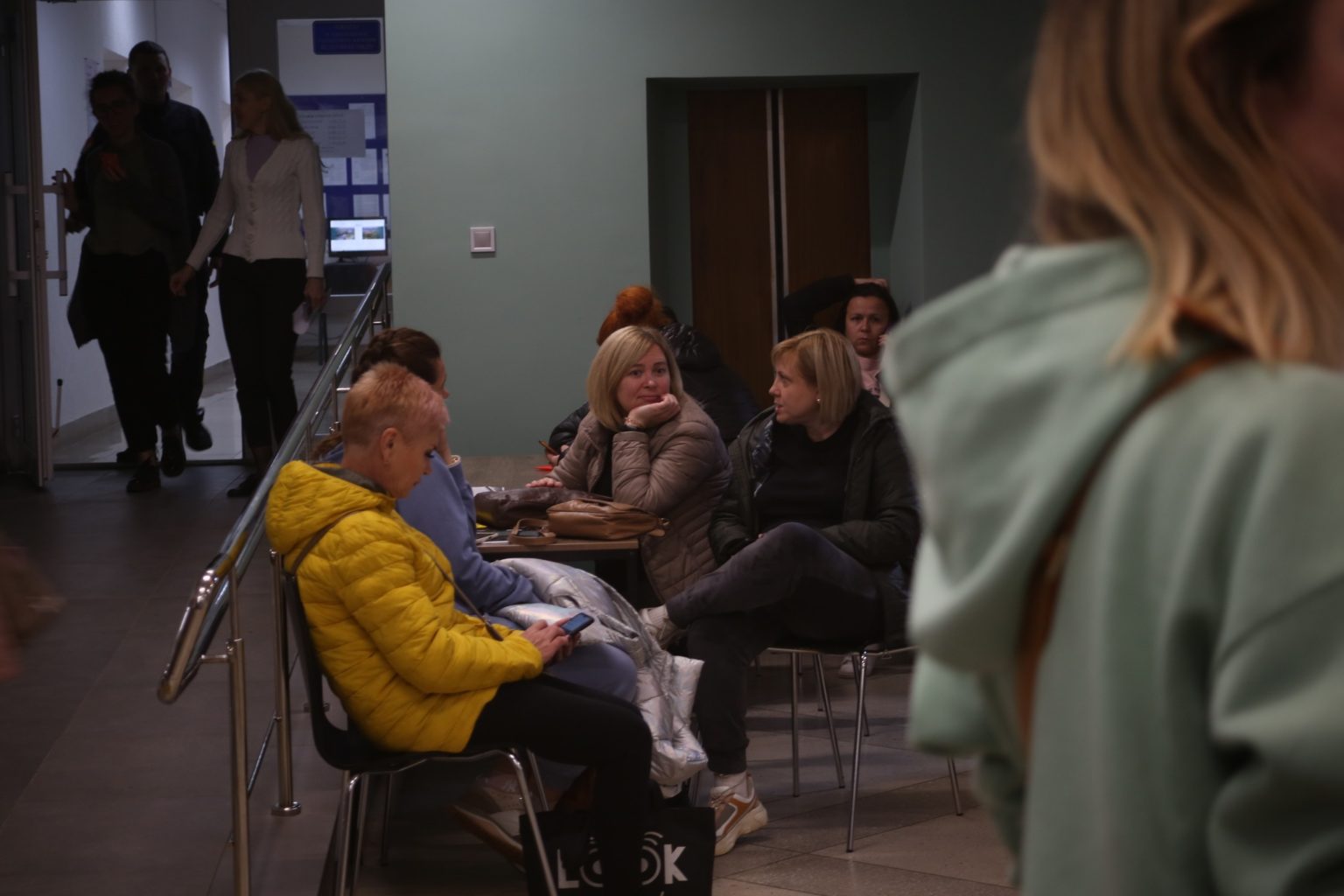
The city faces the critical task of integrating IDPs. The town council publishes biweekly updates on vacancies in a Facebook group, a chatbot, and a telegram channel. With the Ukrainian education reform, school funding is now allocated based on student enrollment, so the town receives more funds from the states when students attend local schools.
Aliona, 24, told us that she decided to rent a flat here in Novovolynsk with her baby because it is much cheaper than in Lutsk, the regional capital. The mayor said the city immediately rejected the idea of modular towns -- temporary buildings to accommodate refugees.
“In the first days I hired Anastasiya Perepelytsia, who worked with internally displaced persons from Zaporizhzhia as an adviser. She told me that modular towns are a failure story. They had one in Zaporizhzhia, and it became a ghetto. Because people who have higher levels of education and income look for normal living conditions, and those who cannot do that move in there. And there they accumulate. That’s why we didn’t do it. Now some of the refugees live in dormitories; we have six dormitories, and the rest live in houses, apartments, and in the homes of friends and relatives. This is good. Although domestic conflicts may arise, especially when three generations return to the same house, it is still better than if they lived in temporary modular houses,” the mayor said.
The city also struggles with renovating older projects with plans for significant investments. Before the full-scale war, the city developed very quickly, the mayor said.
“Over the past year, we received an additional 20 million from the over-execution of the budget. There were colossal plans for this year. Before the war, I used to visit Kyiv once a week to arrange investments. There have already been agreements for 100 million different investments and another 100 potential investments. This would actually be another city budget.”
However, during the war, the town cannot continue its peace-time projects as Law №590 precludes long-term strategic projects. “We need to win, and then all together, we will rebuild our country,” the mayor said.
How the education system integrates displaced persons into town social life
Since the city council collected data about the IDPs, its education department can contact students and invite them to attend local schools. Ukrainian IDPs also have the opportunity to continue online studying at their former schools. Students must choose between the two options. Serhiy Moroz, Head of the Education Department of Novovolynsk, believes that the best thing for students is physically attending school in their current community because it benefits socialization and integration.
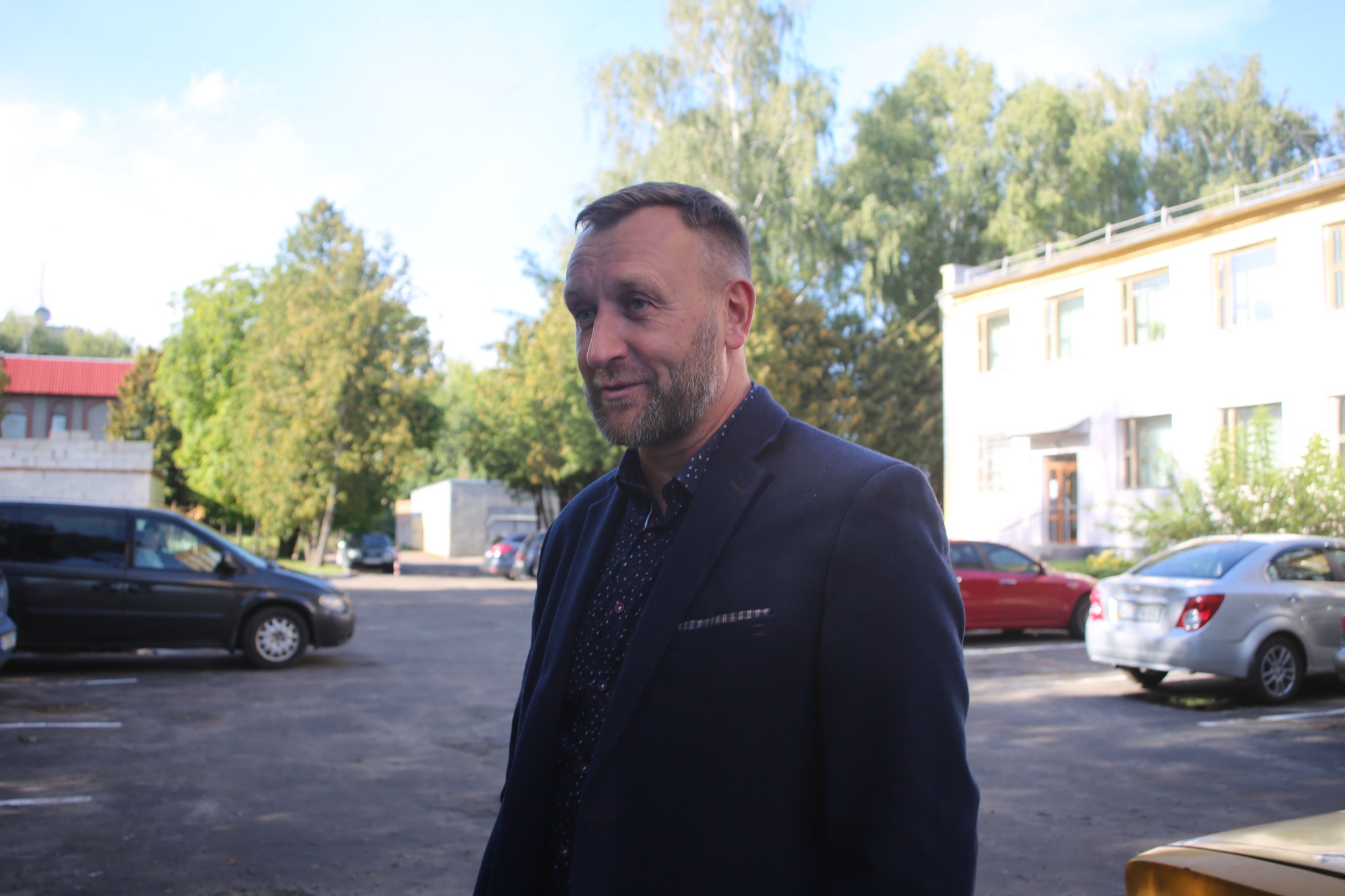
Moroz said that when IDPs first arrived in February and March of 2022, they immediately received information on schools their children could attend. “They went to the director, and without any additional documents they were added to the roster, books were issued literally within an hour.” Schools went online in the first months of the full-scale war; at 7:30 on 24 February, all parents were notified that schools were canceled.
As of September 2022, 186 displaced children began attending local schools. This is less than half of the local IDP student population, as others choose to study online at their previous schools.
Local Novovolynsk children who went abroad also have the opportunity to study online at their home schools. “But it is not easy because according to EU legislation, they must attend school in the country where they are based,” Moroz said.
Some children, however, have already returned to Ukraine. On 24 March, of the 1500 Novovolynsk children who attended preschools, 560 had left the country. Six months later, 285 of them had already returned, and 1000 schoolchildren re-enrolled at their school in Novovolynsk.
Novovolynsk schools are actively involved in volunteering: they have their own small volunteer centers and clothing banks. “Tons of pies and pizzas were provided, masking nets were woven, and a lot of money was collected for medicines,” Moroz said. Kindergartens also received internally displaced persons, fed them, helped those who spoke Russian to improve their skills in the Ukrainian language and its history, introduced them to the city and its architectural monuments, worked with childhood speech therapists to ensure care was continued, and provided psychological assistance. Psychologists gathered and created a psychological health center.
During the war, Novovolynsk schools developed summer projects with partner cities in Germany and Poland. Approximately 300 children went to Poland, Germany, and Lithuania for summer camps.
Moroz hopes that he will be able to return to the older projects they developed. In particular, Novovolysnk partnered with a Mariupol lyceum: in 2018 children from Mariupol and Novovolynsk had an exchange program. Moroz also regrets that there was insufficient time to implement the school budget because of the war. The funds were already allocated from the city council for projects for which people had voted.
Related:
- This volunteer center is the reason Ukraine will win
- Whoever could, fled the Russians. We went back to Irpin to save the rest
- Created in three days, Ukraine’s territorial defense ruined Russian plans to capture Kyiv
- “They were shot in the back of the head.” Eyewitness account of Russia’s murders of Bucha residents
- Ukraine’s secret to resisting Russia: resilience
- Lviv Garrison Church chaplains help soldiers find God amid war. And a pair of good boots
- Ukrainian theology professor turned sniper tells how to hunt for Russian invaders


